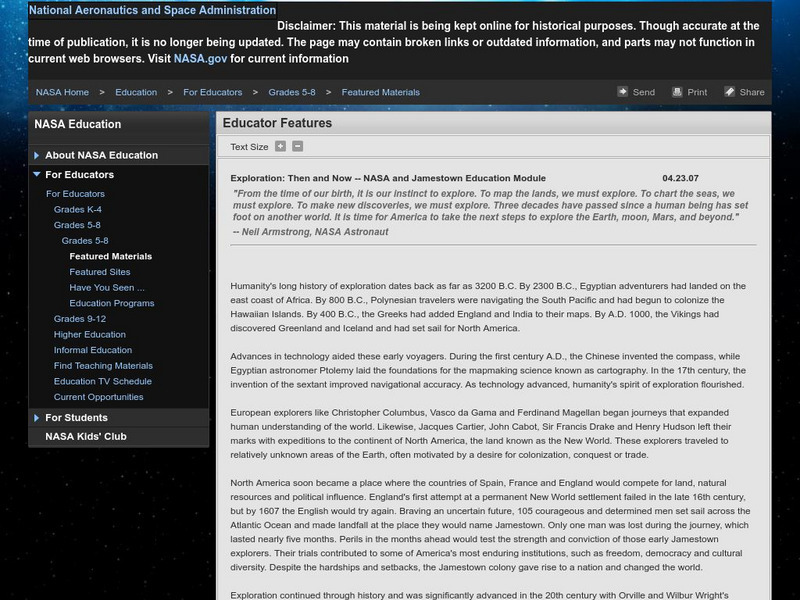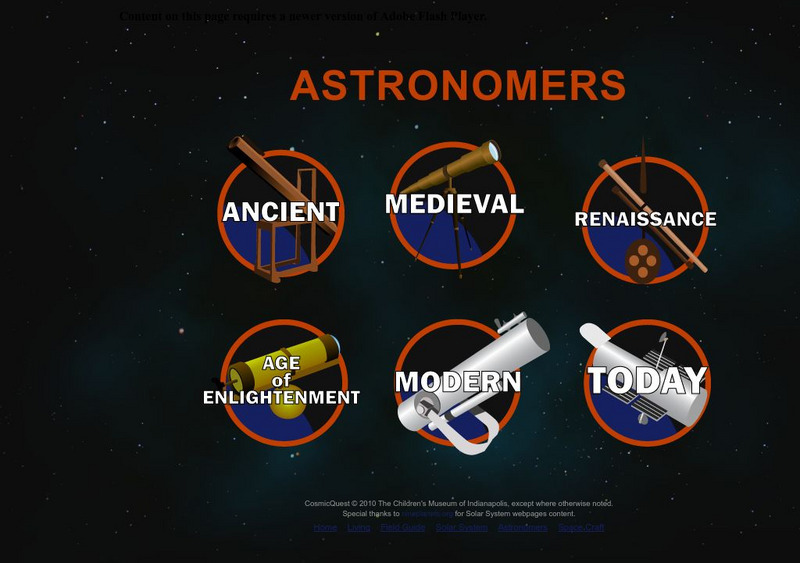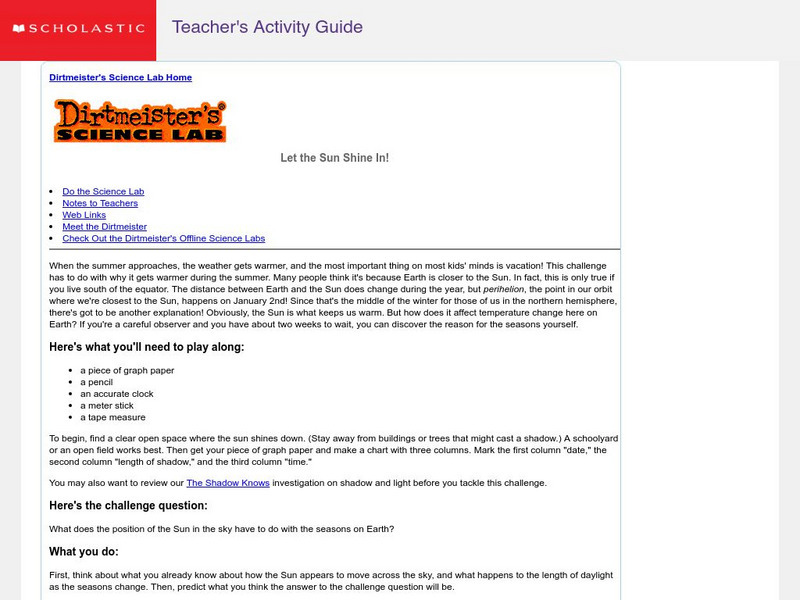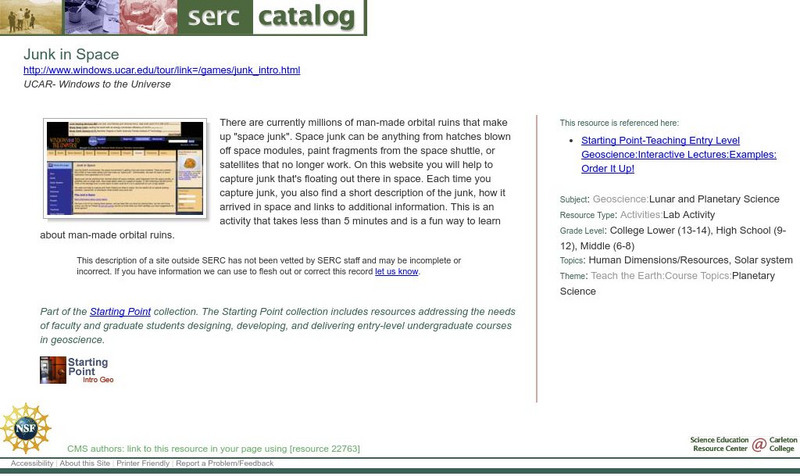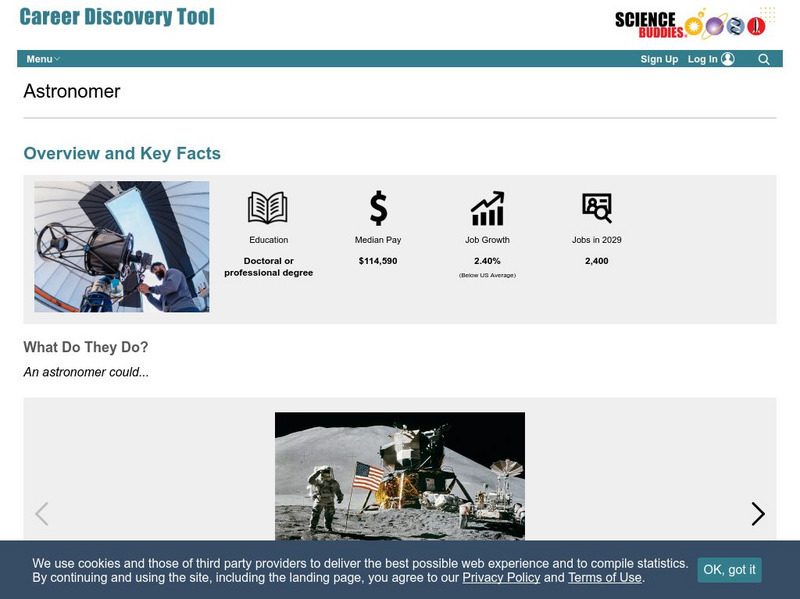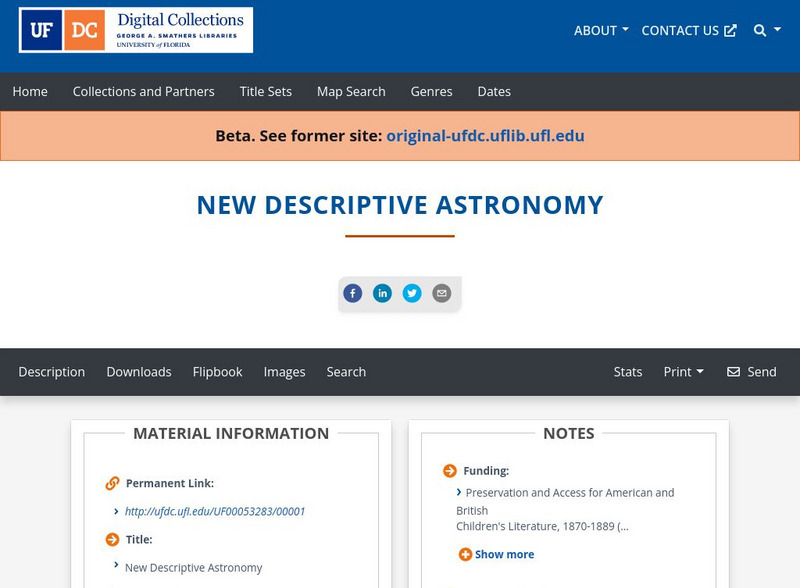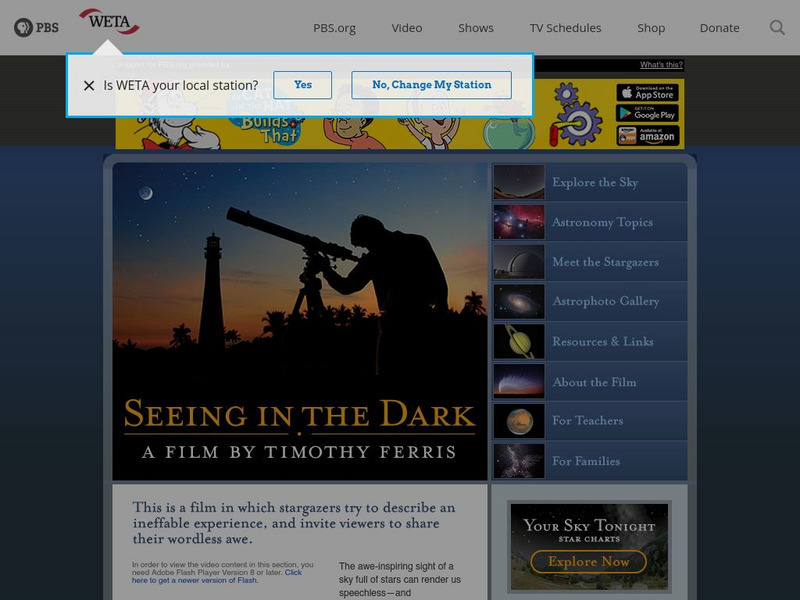NASA
Nasa: Exploration: Then and Now: Nasa and Jamestown Education Module
This small collection of lesson plans introduces students to exploration by comparing the settlement of Jamestown to space missions. Find background information and links to other lesson plans.
Children's Museum
Children's Museum of Indianapolis: Cosmic Quest: Space Craft
Travel to other planets and even outer space, and explore various spacecraft. Get a synopsis about each of the featured planetary space probe missions.
Children's Museum
Children's Museum of Indianapolis: Cosmic Quest: Astronomers
Explore the achievements of notable astronomers beginning with ancient times through modern space explorers.
Scholastic
Scholastic: Dirtmeister's Science Lab: Let the Sun Shine In
Students graph data reflecting time of day and length of shadow, and then draw conclusions about Earth's seasons and position in relation to the Sun.
Science Buddies
Science Buddies: Solid Motor Rocket Propulsion
What does it take to launch a satellite to explore Mars, or a mission to the moon? This project has several possible variations for exploring the physics of rockets. This is rocket science.
Space Telescope Science Institute
Amazing Space: Comets: Comet Facts, Myths, and Legends
An interactive book full of interesting information about comets - their discovery, beliefs about them, factual information, and famous comets. An 'All about comets' link at the bottom of the page has lots of background information on...
Science Education Resource Center at Carleton College
Serc: Planets Made Real: Creating Size and Distance Scale of Planets
An activity where students build a scale model of the solar system based on a marble they pick from a bowl. After choosing a marble that represents Earth, students must calculate the size of the other planets and the sun. Site includes...
Science Education Resource Center at Carleton College
Serc: Know Your Neighbors: Researching the Planets
Students will study planets and moons in our solar system by working online and other resources. This lesson has students working together to generate a spreadsheet of data found. Students will use this information to describe why Earth...
Science Education Resource Center at Carleton College
Serc: Junk in Space
Did you know that there is millions of man-made "space junk" floating in orbit? This game will have you collecting space junk but you have to be careful not collect any objects that should be in space!
Science Buddies
Science Buddies: Career Profile: Astronomer
Reach for the stars by checking into the career as an astronomer. This Science Buddies site lays out the requirements needed to become an astronomer, as well as the education and job description. Included are interviews with people who...
BioEd Online
Bio Ed Online: Microgravity
In this instructional activity learners will use water balloons to simulate the effects of gravity and microgravity on fluid distribution in the body.
University of Florida
Baldwin Library: Steele's Sciences: New Descriptive Astronomy by Joel D. Steele
This is an online photocopy of the original text of the children's book Steele's Sciences: New Descriptive Astronomy by Joel D. Steele (c1884), an astronomy text for children.
PBS
Pbs Learning Media: Solar System Fact Sheet
Use this handy chart to help acquaint yourself with major facts about the solar system. This chart is broken down by planet and displays data such as the size of the planet, distance from the sun, rotation period, orbital period,...
PBS
Pbs Learning Media: Scaled Images of the Solar System
Use the following lithographs to envision the scale of our solar system. View different models of planets at different scales, an infographic about the relative sizes of the planets and distance from the sun, and images of the largest...
California Institute of Technology
Cool Cosmos: Ask an Astronomer
Explore the mysteries of the black hole! Cool Cosmos presents the answers to the most frequently asked questions about this phenomenon. Kids can click on the easy to use question links to find out more.
Harvard University
Harvard University: The Solar System
These hands-on activities are a great way for students to gain perspective on the relative sizes and distances of each planet, the relationship between the sun and Earth, and much more.
PBS
Pbs: Seeing in the Dark
While you won't find the full movie here, there are extensive learning opportunities available to discover the many stars in the sky. Students and teachers will find all sorts of activities, facts, and lessons.
Globe
The Globe Program: El Misterio De Los Colibries Desaparecidos [Pdf]
In Spanish. This science-based storybook introduces students to key concepts in seasons. Includes classroom learning activities that complement the science covered in the book. Requires Adobe Reader.
Harvard University
Harvard University: Eye on the Sky, Feet on the Ground
An ebook filled with information and classroom activities covering several astrological topics such as the Earth's rotation and the solar system. Many tips and teaching tools are available to aid in discovering what the sky has to offer.
Other
Simple Science: Muscle Loss in Space
Learners investigate the effects of zero gravity. The resource has students measure the change in the area of calf muscle from before and after the flight to determine if muscle loss has occurred. Some topics included are muscle loss,...
Other
Simple Science: Planetary Gallery
The innovative resource examines images of the Sun, Moon, Pluto, and all eight planets in the Solar System. Learners calculate the diameter of each object and rank the objects in order of size. The activity has an interactive online...
NASA
Nasa: Space Weather Action Center
This NASA site provides a detailed educator guide on how to establish a Space Weather Action Center in the classroom. After collecting data, students can turn their findings into a news report via digital video.
PBS
Pbs Learning Media: Our Solar System Lithograph Set
View these amazing high-quality images of our solar system from NASA with this lithograph set. Each lithograph contains images, facts, dates, and general information on a particular subject. Background information and teaching tips are...
California Institute of Technology
Cool Cosmos: Ask an Astronomer: Neptune
Resource provides a deeper look at the planet Neptune. Just click on the frequently asked question link and dive into knowledge.


